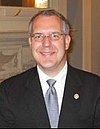Bob Ricks
Bob Ricks | |
|---|---|
| Chief of Police for Edmond, Oklahoma | |
| In office 2003–2017 | |
| Oklahoma Secretary of Safety and Security | |
| In office 1996–2003 | |
| Governor | Frank Keating |
| Succeeded by | Kevin Ward |
| Oklahoma Commissioner of Public Safety | |
| In office 1996–2003 | |
| Governor | Frank Keating |
| Succeeded by | Kevin L. Ward |
| Personal details | |
| Born | Robert A. Ricks October 14, 1944 Houston, Texas |
| Residence | Edmond, Oklahoma |
| Alma mater | Baylor University |
| Occupation | FBI Agent |
| Website | edmondok |
Robert A. Ricks (born October 14, 1944) — known as Bob Ricks and "Backdraft Bob" — is an American law enforcement agent and politician from Texas and Oklahoma. He has worked for the Federal Bureau of Investigation, the Governor of Oklahoma and in local law enforcement. He is best known as the FBI Assistant Special Agent in Charge during the 1993 Waco Siege or as FBI Special Agent in Charge during the 1995 Oklahoma City bombing investigation.
Following his retirement from federal service, Ricks served as the Oklahoma Secretary of Safety and Security under Governor of Oklahoma Frank Keating. He was Secretary during the Keating's entire term as governor, from 1995 to 2003. Concurrent with his service as Secretary, he was also appointed by Keating as Commissioner of the Oklahoma Department of Public Safety.
Education
Ricks was born in Houston, Texas, and received his early education in Del Rio, Texas. He received his Bachelor of Business Administration from Baylor University in 1967 and his Juris Doctor degree from Baylor Law School in 1969, where he served as an Editor of the Baylor Law Review and was a member of Phi Delta Phi.[1]
Federal Bureau of Investigation
Ricks served 26 years in Federal law enforcement from 1969 to 1995, during which he rose from the position of Special Agent with the Federal Bureau of Investigation to Special Agent In Charge of the FBI in Oklahoma. He also served in various other positions of authority from Assistant Special Agent in Charge, Inspector, and Deputy Assistant Director.
Waco Siege
In 1993, Ricks was a Special Agent in Charge of the FBI's Oklahoma City field office. Following a raid on the Branch Davidian church by the Bureau of Alcohol, Tobacco and Firearms on February 28, 1993, the FBI assumed command of the Waco Siege. Ricks was named one of three Assistant Special Agents in Charge, under the direction of Jeff Jamar. The others were Richard Schwein and Richard Swensen.[2]
Ricks served as FBI spokesman during the Waco siege, often speaking for the government at press conferences. On April 16, Ricks told the media:
We are going to get them. . .to bring them before the bar of justice for the murder of our agents. They're going to answer for their crimes. That's the bottom line to this whole thing, they're going to come out.[3]
Ricks told the media that operations were costing $2 million a day.[4] However, a later Senate Appropriations Committee hearing revealed actual costs as of April 22, 1993, were $6,792,000, an average of $130,000 a day.[5]
At the direction of newly appointed United States Attorney General Janet Reno, FBI agents mounted a final assault on the Davidian church on April 19. By the end of the day, 76 Branch Davidians were dead and federal agents had seized control over the compound.
Six years after the Waco siege, Ricks was charged as a defendant in the 1999 civil suit Andrade et al. vs Chojnacki et al.[6]
Oklahoma City bombing
Ricks was serving as the Special Agent in Charge for the FBI's Oklahoma City field office when, on April 19, 1995, Timothy McVeigh destroyed the Alfred P. Murrah Federal Building in downtown Oklahoma City, Oklahoma. It was the most significant act of terrorism on American soil until the September 11 attacks in 2001, claiming the lives of 168 victims and injuring more than 680. As the Special Agent in Charge, Ricks worked with Governor of Oklahoma Frank Keating and senior FBI and United States Department of Justice officials in the response to, and later investigation of, the attack.
Other federal service
Ricks served as chairman for the Oklahoma Federal Executive Board, which had oversight responsibilities for all Federal agencies in the State of Oklahoma. Ricks also served three years with the Drug Enforcement Administration where he was the Chief Counsel for DEA.
Secretary of Safety and Security
After serving 26 years with the FBI, in 1995 Ricks retired from federal service as Special Agent in Charge of the Oklahoma City FBI Field Office. Following his retirement, Governor of Oklahoma Frank Keating appointed him as his Secretary of Safety and Security. As Secretary, Ricks oversaw the Oklahoma Department of Public Safety, the Oklahoma State Bureau of Investigation, the Oklahoma Bureau of Narcotics, the Oklahoma Department of Corrections and the Oklahoma Department of Emergency Management. Concurrently with his service as Secretary, Keating also appointed him Commissioner of Public Safety, giving Ricks direct control over the Oklahoma Highway Patrol.[7]
In 2003 when Democrat Brad Henry was elected to succeed Keating, Ricks agreed to stay on as Secretary in the Henry Administration. He remained in that position until October 2003 when he resigned as Secretary to become the Chief of Police for Edmond, Oklahoma. Henry appointed Kevin Ward, the deputy secretary under Ricks, to succeed him as Secretary.
Edmond Chief of Police
Ricks served as Chief of Police in Edmond, Oklahoma 2003–2017.[1]
References
- ^ a b City of Edmond, Oklahoma Biography of Robert Ricks. Archived September 3, 2009, at the Wayback Machine
- ^ Introduction to Report to the Deputy Attorney General on the Events at Waco, Texas, October 8, 1993, Redacted version.
- ^ Brad Bailey and Bob Darden, Mad Man in Waco, WRS Publishing, p.. 205, 1003.
- ^ Mary Jordan and Sue Anne Pressley, "Cultist may have been forced to stay," The Washington Post, April 21, 1993.
- ^ Senate Committee on Appropriations hearing, p. 122, April 22, 1993.
- ^ Andrade et al. vs Chojnacki et al.
- ^ Governor Keating Names Ricks Cabinet Secretary for Safety and Security Archived September 27, 2011, at the Wayback Machine, Oklahoma Governor's Office Press Release, August 9, 1995.



